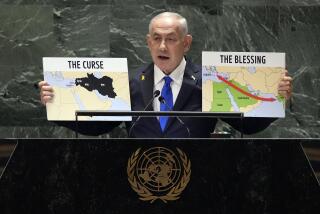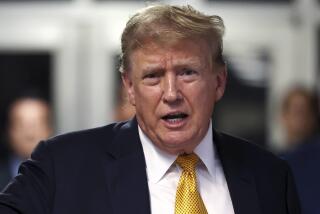Corruption trial of Israeli leader Netanyahu begins amid raucous atmosphere
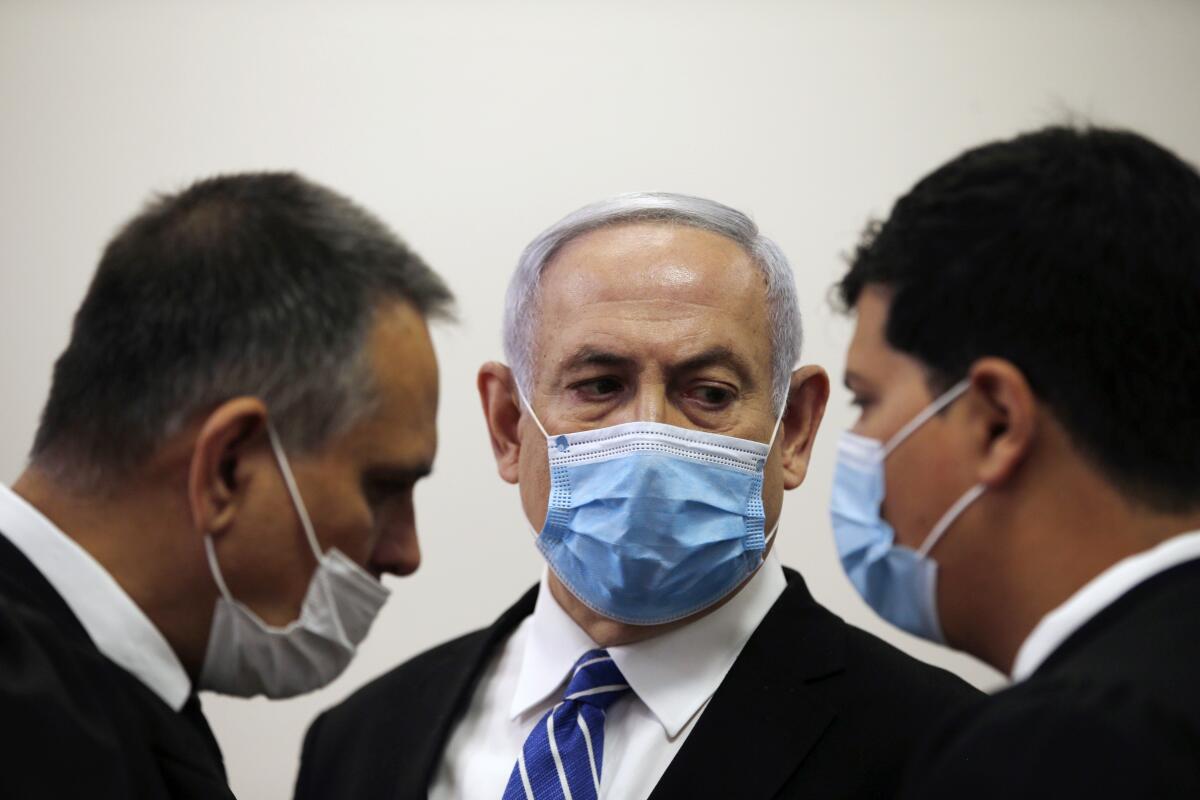
JERUSALEM — As Israeli Prime Minister Benjamin Netanyahu’s corruption trial finally began Sunday, two images from the courtroom steps stood out.
One was of the arrival of chief prosecutor Liat Ben-Ari. The target of a raging campaign of threats and incitement, she was encircled by beefy bodyguards she’d been assigned.
The other was that of a seething Netanyahu, surrounded by ministers applauding as he lambasted Israel’s police, judiciary and media for “wanting to topple me at any cost.”
Netanyahu, Israel’s longest-serving prime minister and the first to be indicted, was charged last November with fraud, bribery and breach of trust in three separate cases in which he was alleged to have attempted to influence or control the media.
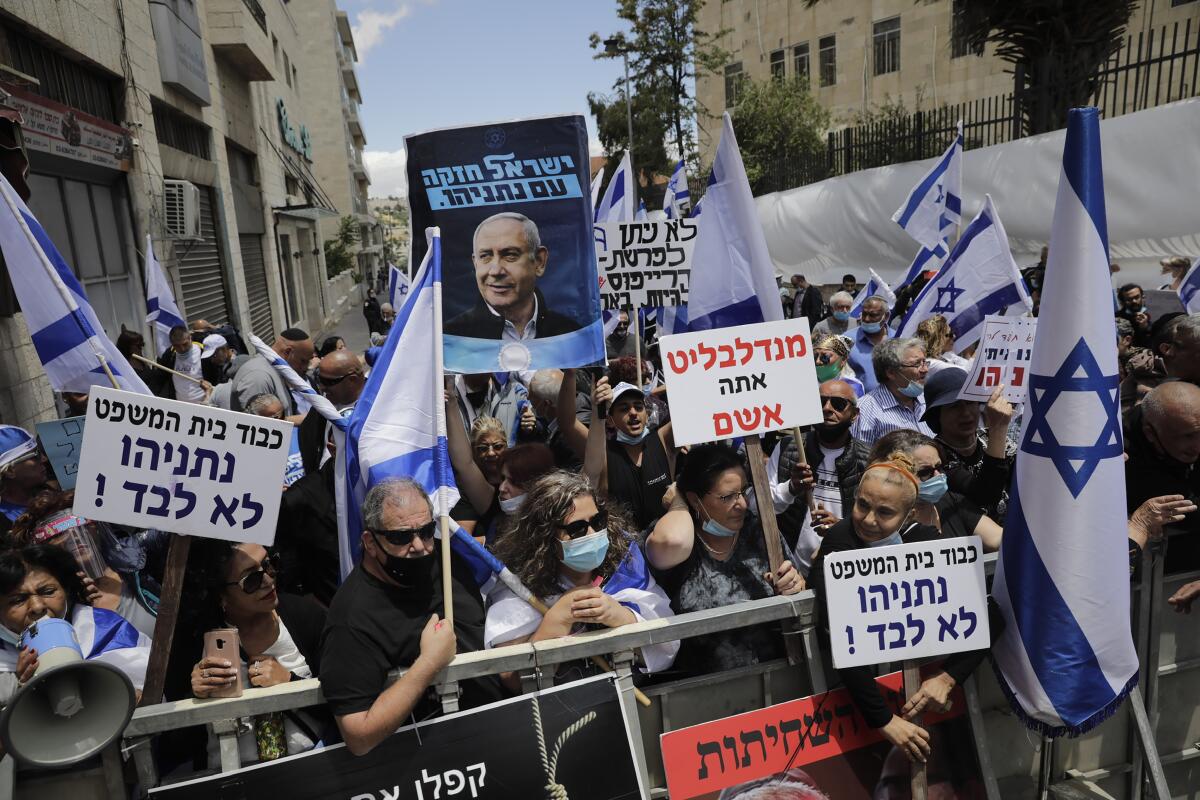
On Sunday, Netanyahu, as he has often done, decried the proceedings as “an attempted coup d’état” by what he described as a vast left-wing conspiracy that “stitched up charges” so as to “block the will of the people.”
Upon his arrival at the courthouse, several hundred supporters blasted supportive slogans and campaign jingles of his Likud party.
“Bibi, King of Israel” and “Bibi, you’ll never walk alone,” they shouted, referring to him by his nickname.
The start of the trial culminated four years of police investigations, judicial probes, shocking news leaks and what critics termed an unprecedented assault against state institutions by the man who had led the nation for almost a dozen years.
Inside the courthouse, a far more restrained Netanyahu stood up in District Judge Rivka Friedman-Feldman’s small courtroom, No. 317, to formally identify himself and acknowledge understanding the charges against him. Due to regulations in place to combat the coronavirus, Netanyahu wore a mask, as did all others in the courtroom, and was accompanied by a single attorney.
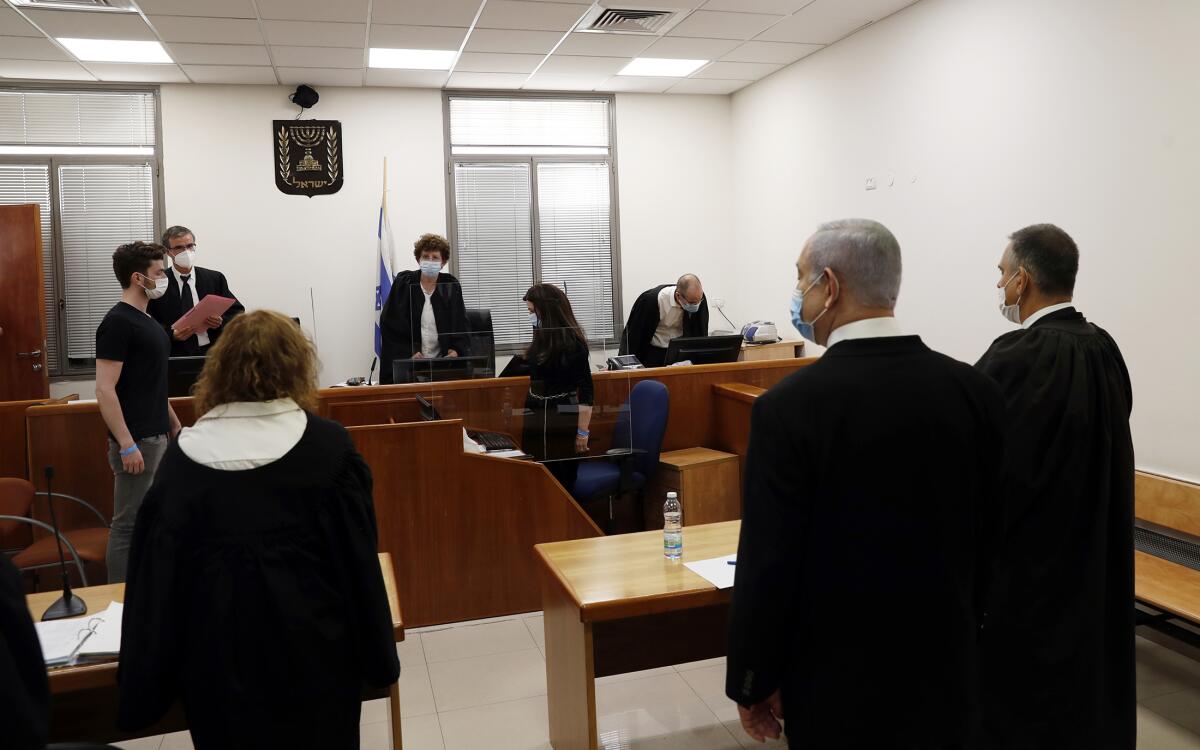
Three co-defendants sat nearby.
Arnon Mozes, the owner of Yediot Ahronot, the largest tabloid in Israel, is alleged to have conspired with the prime minister to sway his newspaper’s coverage in exchange for a law that would have quashed Israel Hayom, a free daily paper established by Las Vegas casino mogul Sheldon Adelson meant to support Netanyahu.
Shaul Elovitch, controlling shareholder of Bezeq, the Israeli telecoms giant, and his wife, Iris, are alleged to have received regulatory favors benefiting their company from Netanyahu, again, in exchange for positive media coverage on the Walla news portal, owned by Bezeq.
“Never, in the history of any democracy, has anyone been indicted over positive media coverage,” Netanyahu declared ahead of the session, quoting American lawyer Alan Dershowitz, a close ally who represented President Trump during his impeachment trial.
But in a statement released after the court session, which lasted less than an hour, Israeli Atty. Gen. Avichai Mandelblit said the judiciary would “continue our work even in the face of relentless attempts to attribute conflicts of interests to law enforcement, which we reject. We will continue to act on the principle that everyone is equal under the law.”
The trial takes place amid an ongoing fractious political environment, in which three inconclusive elections were held in a span of a year before Netanyahu and his rival, centrist Benny Gantz, finally swore in a new government last week. Gantz agreed to serve in the newly created post of “alternative prime minister.”
In his public remarks outside the courthouse, Netanyahu linked his signature policy promise of West Bank annexation to his ongoing legal troubles.
“They can’t defeat a strong, right-wing prime minister at the ballot box, so they are trying to oust me through stitched-up charges,” he railed, surrounded by a cadre of ministers from his Likud party.
“I won’t give up a single settlement!” he promised, mocking any possible successors to his reign as “poodles.”
The coalition agreement, reached in the midst of the COVID-19 pandemic, allows Netanyahu to present legislation annexing the West Bank, or parts of it, as of July 1 but releases Gantz and the legislators from his party, Blue and White, from any obligation to support the law.
European nations, the Arab world and many international organizations have decried any unilateral Israeli move toward annexation as a grave breach of international law. The European Union has threatened to sanction Israel as Netanyahu seeks to impose Israeli sovereignty over the West Bank, which the Palestinian Authority views as the heart of a future Palestinian state.
Among key world leaders, only Trump has supported the concept, most prominently in parts of the economic plan for renewing Israeli-Palestinian negotiations developed by the president’s son-in-law and senior aide, Jared Kushner.
In a radio interview, Limor Livnat, a former minister in Netanyahu’s government, distanced herself from the prime minister’s remarks and his ministers’ applause.
“The right is not on trial,” she said. “There is no conspiracy to oust him, however many times he repeats the claim. When he says this is an attempt to oust a right-wing prime minister only because he is strong and not a poodle — well, we’ve had strong prime ministers before. Yitzhak Shamir didn’t remove any settlements.”
The raucous atmosphere on the courtroom steps was balanced by the measured, deliberative domain of Judge Friedman-Feldman, who heads the three judge-panel that will decide Netanyahu’s fate.
Less than an hour after adjourning the initial session, Judge Friedman-Feldman turned down Netanyahu’s attorney’s request for a lengthy delay, scheduling the next session for July 19.
More to Read
Sign up for Essential California
The most important California stories and recommendations in your inbox every morning.
You may occasionally receive promotional content from the Los Angeles Times.
